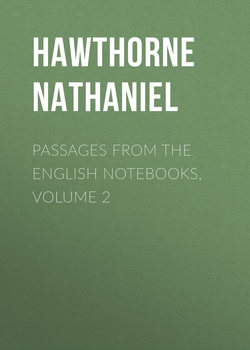Passages from the English Notebooks, Volume 2

Реклама. ООО «ЛитРес», ИНН: 7719571260.
Оглавление
Hawthorne Nathaniel. Passages from the English Notebooks, Volume 2
LONDON. – MILTON-CLUB DINNER
REFORM-CLUB DINNER
THE HOUSE OF COMMONS
SCOTLAND. – GLASGOW
EDINBURGH. – THE PALACE OF HOLYROOD
HOLYROOD ABBEY
HIGH STREET AND THE GRASS-MARKET
THE CASTLE
MELROSE
DRYBURGH ABBEY,
ABBOTSFORD,
BERWICK,
NEWCASTLE,
YORK,
YORK MINSTER
LIVERPOOL
MANCHESTER,
BORROW,
SOUTHAMPTON
THE CATHEDRAL
STONEHENGE,
GLOUCESTER,
THE CATHEDRAL,
NETLEY ABBEY,
TO BLACKHEATH
THE WINE-VAULTS OF THE LONDON DOCKS
OXFORD
MERTON COLLEGE,
RATCLIFFE LIBRARY
THE BODLEIAN LIBRARY
THE TAYLOR INSTITUTE,
HAMPTON COURT,
SOUTHPORT
ORMSKIRK CHURCH
THE CATHEDRAL
TO YORK
BOLTON PRIORY,
YORK
EASTER SUNDAY,
THE MINSTER
MANCHESTER CATHEDRAL,
MR. BROWNE'S FREE LIBRARY,
THE CATHEDRAL,
TO NOTTINGHAM
NOTTINGHAM
NEWSTEAD ABBEY,
MATLOCK,
TO SCOTLAND
GLASGOW
DUMBARTON CASTLE,
INVERANNAN
INVERSNAID
THE TROSACHS' HOTEL. – ARDCHEANOCHROCHAN
LOCH KATRINE,
BRIG OF ALLAN
STIRLING
LINLITHGOW,
EDINBURGH,
MELROSE
ABBOTSFORD,
DURHAM
DURHAM CATHEDRAL
YORK,
OLD TRAFFORD, MANCHESTER
LEAMINGTON
KENILWORTH
LIVERPOOL
LEAMINGTON
LONDON
BRITISH MUSEUM,
Отрывок из книги
April 4th, 1856. – On Tuesday I went to No. 14 Ludgate Hill, to dine with Bennoch at the Milton Club; a club recently founded for dissenters, nonconformists, and people whose ideas, religious or political, are not precisely in train with the establishment in church and state. I was shown into a large reading-room, well provided with periodicals and newspapers, and found two or three persons there; but Bennoch had not yet arrived. In a few moments, a tall gentleman with white hair came in, – a fine and intelligent-looking man, whom I guessed to be one of those who were to meet me. He walked about, glancing at the periodicals; and soon entered Mr. Tupper, and, without seeing me, exchanged warm greetings with the white-haired gentleman. "I suppose," began Mr. Tupper, "you have come to meet – " Now, conscious that my name was going to be spoken, and not knowing but the excellent Mr. Tupper might say something which he would not, quite like me to overhear, I advanced at once, with outstretched hand, and saluted him. He expressed great joy at the recognition, and immediately introduced me to Mr. Hall.
The dining-room was pretty large and lofty, and there were sixteen guests at table, most of them authors, or people connected with the press; so that the party represented a great deal of the working intellect of London at this present day and moment, – the men whose plays, whose songs, whose articles, are just now in vogue. Mr. Tom Taylor was one of the very few whose writings I had known anything about. He is a tall, slender, dark young man, not English-looking, and wearing colored spectacles, so that I should readily have taken him for an American literary man. I did not have much opportunity of talking with him, nor with anybody else, except Dr. – , who seemed a shrewd, sensible man, with a certain slight acerbity of thought. Mr. Herbert Ingram, recently elected member of Parliament, was likewise present, and sat on Bennoch's left.
.....
April 8th. – On Saturday evening, at ten o'clock, I went to a supper-party at Mr. D – 's, and there met five or six people, – Mr. Faed, a young and distinguished artist; Dr. Eliotson, a dark, sombre, taciturn, powerful-looking man, with coal-black hair, and a beard as black, fringing round his face; Mr. Charles Reade, author of Christie Johnstone and other novels, and many plays, – a tall man, more than thirty, fair-haired, and of agreeable talk and demeanor.
On April 6th, I went to the Waterloo station, and there meeting Bennoch and Dr. – , took the rail for Woking, where we found Mr. Hall's carriage waiting to convey us to Addlestone, about five miles off. On arriving we found that Mr. and Mrs. Hall had not yet returned from church. Their place is an exceedingly pretty one, and arranged in very good taste. The house is not large; but is filled, in every room, with fine engravings, statuettes, ingenious prettinesses or beautifulnesses in the way of flower-stands, cabinets, and things that seem to have bloomed naturally out of the characters of its occupants. There is a conservatory connected with the drawing-room, and enriched with lovely plants, one of which has a certain interest as being the plant on which Coleridge's eyes were fixed when he died. This conservatory is likewise beautified with several very fine casts of statues by modern sculptors, among which was the Greek Slave of Powers, which my English friends criticised as being too thin and meagre; but I defended it as in accordance with American ideas of feminine beauty. From the conservatory we passed into the garden, but did not minutely examine it, knowing that Mr. Hall would wish to lead us through it in person. So, in the mean time, we took a walk in the neighborhood, over stiles and along by-paths, for two or three miles, till we reached the old village of Chertsey. In one of its streets stands an ancient house, gabled, and with the second story projecting over the first, and bearing an inscription to the purport that the poet Cowley had once resided, and, I think, died there. Thence we passed on till we reached a bridge over the Thames, which at this point, about twenty-five miles from London, is a narrow river, but looks clean and pure, and unconscious what abominations the city sewers will pour into it anon. We were caught in two or three showers in the course of our walk; but got back to Firfield without being very much wetted.
.....